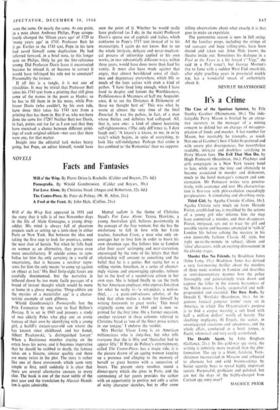NOVELS
Facts and Fantasies
Will o' the Wisp. By Pierre Drieu la Rochelle. (Calder and Boyars, 27s. 6d.) Pornografia. By Witold Gombrowicz. (Calder and Boyars, 30s.) For Love Alone. By Christina Stead. (Angus and Robertson, 32s. 6d.) The Centre-Piece. By Peter de Polnay. (W. H. Allen, 21s.)
A Fool at the Feast. By John Hale. (Collins, 21s.)
Will 0' the Wisp first appeared in 1931 and the story that it tells is of two November days in the life of Alain Gonzague, a young drug- addict. His mind is always full of phantom projects such as setting up a junk-shop in either Paris or New York. But between the idea and taking the first step to look for premises, comes the next shot of heroin. Yet when he falls back on women as an alternative, they prove even more unsatisfactory. If suicide comes to sym- bolise for him the only certainty in a world of uncertainty, that is because a revolver repre- sents for him the only means `to come up against an object at last.' His final forty-eight hours are carefully documented, but the narrative is tethered down by too many facile passages of a brand of instant thought which would be more at home in a glossy magazine. 'Drug-addicts are the mystics of a materialist age' is a charac- teristic example of such glibness.
Witold Gombrowicz's Pornografia lost the Prix Formentor by one vote to Saul Bellow's Herzog. It is set in 1943 and presents a study of two elderly Poles who play out an erotic fantasy of their own by identifying with a young girl, a bailiff's sixteen-year-old son whom she has known since childhood, and her fiancé, Albert Paszkowski, 'a distinguished lawyer.' When a Resistance member staying on the estate loses his nerve, and it becomes imperative that he should be stabbed to death, the fantasy takes on a bizarre, sinister quality and there are many twists in the plot. The story is rather like one of those crosswords which seem very simple at first, until suddenly it is clear that there are several alternative answers to every clue. The book is one of the most subtle of the past year and the translation by Alastair Hamil- ton is quite admirable. Mental sadism is the theme. of Christina Stead's For Love Alone. Teresa Hawkins, a young Australian girl, believes passionately in the concept of the free woman; but she has the misfortune to fall in love with her I.atin teacher, Jonathan Crow, a man who only en- courages her to love him in order to boost his own shrunken ego. She follows him to London after four years' scrimping and near-starvation, encouraged by the tone of his letters that their relationship will amount to something and the belief that he is a genius. But seeing her as a willing victim, Jonathan, in a series of alternat- ingly vicious and encouraging episodes, reduces her to the level of a second-rate citizen in her own eyes. She is helped finally to see the truth by her American employer, who exposes Jonathan for what he really is—`a wit-picker, a notion- thief, . . . a paste-and-scissors scholar, of the kind that often makes a name for himself by writing forewords to great works.' This novel originally came out in 1944 and is now re- printed for the first time. On a former occasion, another reviewer in these columns referred to Christina Stead as 'one of the finest prose writers in our tongue.' I endorse the verdict.
Mrs Harriet Visser Long is an American millionairess who is sixty-five, but who tells everyone that she is fifty and `thereafter had to appear fifty.' If Peter de Polnay's entertainment, called The Centre-Piece, has a tragic side, it is the picture drawn of an ageing woman keeping up a pretence and clinging to the memory of herself as great hostess with a succession of lovers. The present story revolves round a dinner-party which she gives in Paris, and the summoning of her guests provides the author with an opportunity to portray not only a series of witty character sketches, but to offer some
telling observations about what exactly it is that goes to make an expatriate.
The pantomime season is now in full swing. All the familiar props, including the strings of red sausages and huge rolling-pins, have been dusted and taken out. John Hale knows the theatre inside out. Sometimes his dialogue in a Fool at the Feast is a bit forced (` "Ugg," she said in a Piaf voice'), but George Morton's rise to fame with a sudden West End smash-hit, after eight gruelling years in provincial weekly rep, has a wonderful smack of authenticity about it.
NEVILLE BRAYBROOKE






































 Previous page
Previous page